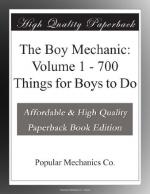Produced by Don Kostuch
The Boy Mechanic
Vol. 1
700 Things for Boys to Do
800 Illustrations Showing How
Jack Mansfield + Ed
Jan 28, 1938
August 1916
From Mother
THE BOY MECHANIC VOLUME I
Transcriber’s Notes
This text accurately reproduces the original book except for adherence to Project Gutenburg guidelines. Each project title is followed by its original page number to allow use of the alphabetical contents (index) at the end of the book. The book used very complex typesetting to conserve space. This transcription uses simple one-column linear layout.
The text only version is of limited use because of the widespread occurrence of diagrams and illustrations. Use the pdf version for the complete text.
Many projects are of contemporary interest—magic, kites and boomerangs for example. Try a “Querl” for starters.
There are many projects of purely historical interest, such as chemical photography, phonographs, and devices for coal furnaces.
Another class of projects illustrate the caviler attitude toward environment and health in 1913. These projects involve items such as gunpowder, acetylene, hydrogen, lead, mercury, sulfuric acid, nitric acid, cadmium, potassium sulfate, potassium cyanide, potassium ferrocyanide, copper sulfate, and hydrochloric acid. Several involve the construction of hazardous electrical devices. Please view these as snapshots of culture and attitude, not as suggestions for contemporary activity.
Be careful and have fun or simply read and enjoy a trip into yesterday.
[Illustration: How to Make a Glider (See page 171)]
THE BOY MECHANIC
VOLUME I
700 Things for boys to do
HOW TO CONSTRUCT
Wireless outfits, boats, camp
equipment,
aerial gliders, kites, self-propelled
vehicles
engines, motors, electrical apparatus,
cameras
and
hundreds of other things which
delight every boy
WITH 800 ILLUSTRATIONS
Copyrighted, 1913, by H. H. Windsor
Chicago
popular mechanics co.
Publishers
** A Model Steam Engine [1]
The accompanying sketch illustrates a two-cylinder single-acting, poppet valve steam engine of home construction.
The entire engine, excepting the flywheel, shaft, valve cams, pistons and bracing rods connecting the upper and lower plates of the frame proper, is of brass, the other parts named being of cast iron and bar steel.




